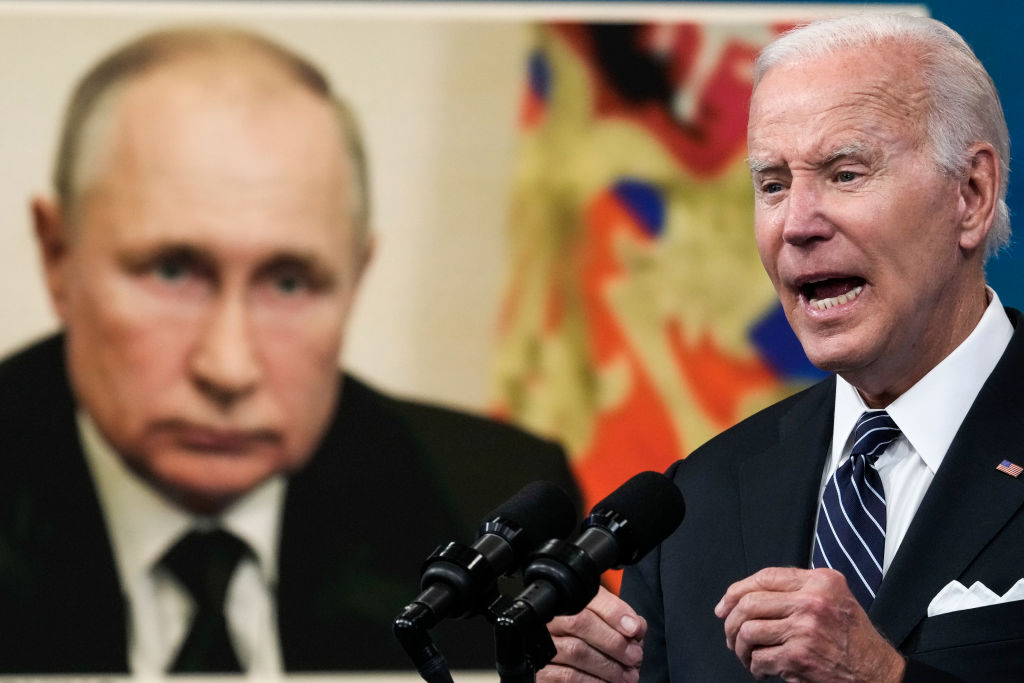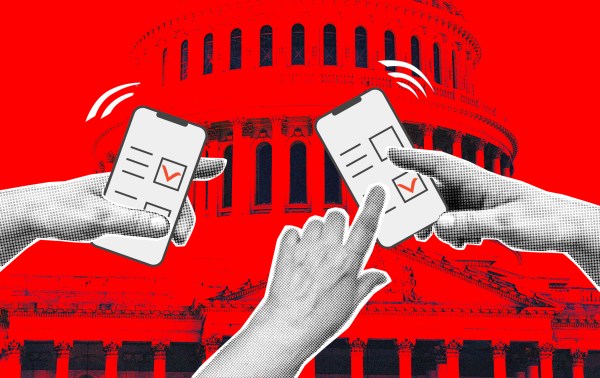If we are, as President Joe Biden insists, today closer to nuclear “Armageddon” than at any time since the Cuban missile crisis, shouldn’t we be … doing … something?
Biden’s casual remarks about the likelihood of a thermonuclear holocaust were just one in a series of daft remarks by means of which the president seems to be practically begging his fellow Democrats to spare him the burdens of a seeking a second term: A few days later, he lamented the death of his son Beau, who “lost his life in Iraq,” a thing that—let’s go ahead and emphasize here—did not happen. Speculating about Biden’s cognitive capacity—just old and forgetful, or suffering from full-on dementia?—is a Republican obsession, but it is complicated: Biden surely was not suffering from dementia back in 1987, when as a presidential candidate he put forward observations about his life that were not quite fiction, exactly, but events that happened to someone else. (British politician Neil Kinnock, in fact.) Biden wasn’t suffering from dementia when he made up a story about his first wife and child being killed by a drunk driver, a thing that—let’s go ahead and emphasize here again—did not happen. (The two did die in a terrible automobile accident, which investigators said probably was caused by Mrs. Biden; the other driver was not drunk, was not accused of being drunk, was not investigated for drunk driving, etc.) Biden is dotty, and dottier than he used to be, but he has been very dotty for a very long time.
More relevant to the immediate issue before us is the possible dottiness of Vladimir Putin. Putin has a reputation for being a cold-eyed opportunist, but there are rumors that he has grown isolated, out-of-touch, and paranoid. It certainly seems to be the case that his expectations of what invading Ukraine would be like were wildly unrealistic. Putin may not have Biden’s problems, but we have to consider the possibility that he is no less delusional.
Nuclear weapons mounted to missiles that can reach U.S. cities are a real thing. Russia has them. China has them. North Korea has them. Even if we treat as unlikely the possibility that Putin’s humiliating fiasco in Ukraine will somehow escalate to a Russian nuclear strike on Washington and New York, the probability of a nuclear attack on the United States—by means of an intercontinental ballistic missile or some other vehicle—is far from zero.
If we take this possibility seriously—and we should—why aren’t we doing anything? Or, more precisely, what are we doing, and why have we done so little?
It is not as though we have not had time to prepare. The Soviets tested their first nuclear weapon during the Truman administration, and schoolchildren were being taught to duck under their desks in response to nuclear attack back in the Eisenhower years. When the Reagan administration got serious about strategic missile defense in the 1980s, Democrats led by the “liberal lion of the Senate”—the amoral, power-hungry monster Edward Kennedy—did their shameful best to mock the idea into dormancy. Americans who know only the Cold War cartoon version of Ronald Reagan and his administration do not appreciate what a peacenik the guy was: Reagan’s dream was for the United States to develop an ironclad missile-defense system and then share it with the Soviet Union, thereby rendering both countries’ ICBM arsenals useless. Instead, the so-called partisans of peace fought tooth and talon against purely defensive measures, and, indeed, they continue to do so: Consider this anti-missile-defense propaganda from the Carnegie Endowment for International Peace, Alger Hiss’ old pulpit. The United States has made remarkable progress on the very complex challenges of missile defense, but very likely would have achieved a great deal more without the entirely opportunistic and ideological resistance to this textbook public good.
The best outcome is, obviously, no nuclear strike on the United States—or any other country—with some combination of diplomacy, deterrence, conventional military force, and, if it comes to it, missile defense preventing any attempted attack or rendering such an attempt unsuccessful. But the best outcome is not the only possible outcome, and it is not necessarily the most likely one.
A nuclear strike on the United States would constitute a general social catastrophe, with financial and supply-chain disruptions that would make the worst of COVID-19 look like 18 holes at Pebble Beach on a fine June day. Responding to such a catastrophe would require the mobilization of the whole of the American people, a phrase—and an idea—that I do not much enjoy writing or hearing. Authoritarians, whether of the progressive or nationalist bent, cherish the idea of mobilizing the people in the service of some great cause, because such a mobilization goes hand-in-hand with the regimentation of private life, putting families and individuals under national political discipline. As Jonah Goldberg and I were discussing recently on the Remnant podcast, there is a kind of sentimentality—bizarre, to my mind—that attaches to such projects. There are Americans who fondly remember World War II-era rationing and New Deal programs seeking to enact what amounted to a civilian draft. There are conservatives and progressives in our time who thrill to the idea of mandatory national service, at the root of which enthusiasm one detects a particular emphasis on the words national and mandatory.
We have seen a couple of decades’ worth of doomcasting in our politics and popular culture, from earnest preppers to ironic zombie-apocalypse literature—the dark side of immanentizing the eschaton. The foundational model of civilian preparedness—the citizen militia—was long ago abandoned, and both the word militia and the organizational concept associated with it have come into very bad odor because of the association of the word and the concept with a particularly imbecilic strain of right-wing fringe politics. But the desire to activate the general citizenry as some part of a grand national crusade—the sort of thing that imbues regular old grimy politics with some kind of transcendent meaning—is always with us. We saw a bit of it after 9/11. We saw it (and continue to see it) in over-the-top COVID reactions. We see it in vigilantism, riots, amateur border patrols, and many other things of that nature—some well-intended, some meretricious, some dangerous and destructive. But we should keep in mind that the existence of a bad version of some tendency—or even the prevalence of a bad version or bad versions—does not mean that there is no good or useful or necessary version of that tendency. In a state of genuine national crisis of the sort and scale President Biden seems to be contemplating in his daft and idle way, FEMA is not going to be able to do everything.
We have some pretty good examples of what a more useful model of civil-response organization might look like. For example, in many large counties, there are substantial sheriffs’ “auxiliaries” or “reserves,” volunteer deputy sheriffs who can be activated to perform certain tasks for which they are trained. Harris County, Texas, where Houston is located, has a notable one, with more than 200 trained volunteers who work without pay. They do ordinary sheriff work (patrol, prisoner transport) but in emergencies they can be called upon to do simple but critical things, such as directing traffic when the signal system goes down. These are the kinds of groups we want trained up to do things such as distributing anti-radiation medicine in the event of a nuclear crisis. We probably don’t need new organizations—another big committee for the Max Fischers of our public life to be in charge of—but we should be looking at new and better ways to distribute the necessary preparatory work among the highly functional civil organizations we already have.
I am not sure that I agree with President Biden’s assessment of the current situation. But if the chance of things going seriously sideways in a nuclear way is one in 20, we aren’t doing enough; if it is one in 200, we aren’t doing enough. And what needs to be done isn’t the work of a day—it’s a 20-year project that should have been started 30 years ago. But the fact that we have failed to act for so long is no reason to keep failing to act.







Please note that we at The Dispatch hold ourselves, our work, and our commenters to a higher standard than other places on the internet. We welcome comments that foster genuine debate or discussion—including comments critical of us or our work—but responses that include ad hominem attacks on fellow Dispatch members or are intended to stoke fear and anger may be moderated.
With your membership, you only have the ability to comment on The Morning Dispatch articles. Consider upgrading to join the conversation everywhere.